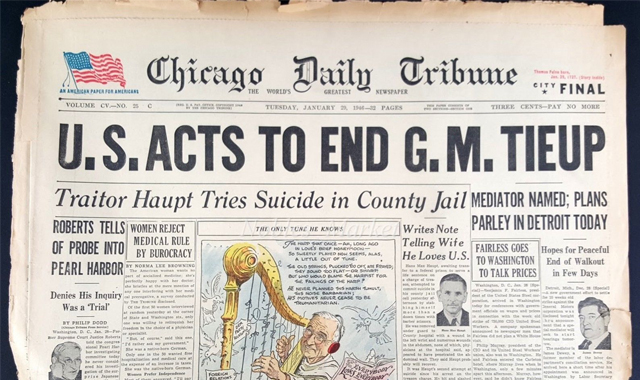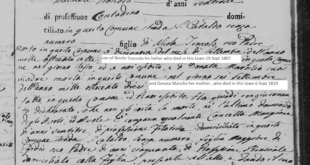Last month we reviewed newspaper resources. If you know the date, for death notices and such, you should find microfilm and go ahead and locate the death notice in the paper. If you are just trolling for any mention of your family name, you will need to use only searchable digitized newspapers.
This logic can apply to any newspaper research, whether in Chicago or not. There is no way to go through newspapers nationwide, but let’s find out what is available in Chicagoland.
At this writing, we have the Chicago Tribune and the Chicago Sun Times, plus suburban papers like the Daily Herald and the Southtown Star. There are also many small local publications, most of which are found at the local library of the town they originate in, if at all.
There are also papers that no longer exist. If I tossed that to most of you as a trivia question, you would probably think of the Chicago Daily News first, since that paper ceased publication in 1978. However, many people do not know just how many older newspapers Chicago has had. These are newspapers that are available on microfilm at the Harold Washington Library downtown:
Chronicle: 1898-1907
Defender: 1909-present but no longer daily (African American)
Daily News: 1875-1978
Daily Times: 1929-1948 (merged with the Sun)
Evening Post: 1890-1932
Examiner: 1908-1918
Herald Examiner: 1882-1895
Record/Herald: 1881-1914
Merged Herald Examiner: 1914-1928
Became Herald Examiner/American: 1928-1940
Became Herald American: 1940-1954
Became American: 1954-1961
Became “Chicago’s American”: 1961-1969
Inter Ocean: 1872-1914
Journal: 1844-1929
Sun: 1941-1948 merged with Daily Times to become Sun-Times
Times: 1855-1893 not related to the Daily Times
If you have tried to find a death notice in the Tribune and failed to find one, these many papers are possible alternative sources.
I will add a caveat to the entire death notice search as it applies to Chicago’s Italian community. I have found an almost complete lack of death notices for Italians in Chicago prior to the 1940s. There are some, so be sure, and they seem to belong to families that have been here for two generations or more. Obviously most non-English speakers will not waste money posting a death notice in a newspaper that their fellow-non-English-speakers cannot read. By the time the families had become more assimilated and had moved farther apart, then the newspaper death notice was more necessary.
There are many ethnic newspapers but few of them are at the Harold Washington, and most of them have a short life span. The exception is the Dziennik Chicagoski Polish newspaper that ran from 1893-1971 and contains a lot of death notices in Polish. This paper can be found at the Polish Museum Library at 984 N. Milwaukee Ave.
The sad fact is that very few of these papers are on-line and searchable. Newspapers.com and ProQuest Tribune Archives are the two best resources for searching the Tribune. Newspapers.com runs the entire span of the newspaper. ProQuest is slowly adding the 1990s and working toward the present. Legacy.com has most death notices for the 2000s and 2010s Tribunes as well as many other non-Chicago papers.
Let’s discuss digitized searchable newspapers for a minute. This is a computer techie problem, but it is worth understanding why digitized newspapers are not always the most accurate searchable documents. Part of the problem is that the physical newspapers have yellowed by the time microfilming technology existed. Also, due to the paper being cheap, it bends easily. Now that we have yellow bent cheap paper, the digitizing company scans the newspaper pages, with many different fonts and print sizes, plus photos. Then they take a computer program and throw the scanned multi-font, yellow bent cheap scans and tries to find words. It would be hopelessly difficult to have humans read the text and type it in, so they have computers try to do it. However, due to the frequently poor quality of the initial scans, sometimes the words you need (surnames especially) do not appear in the index. Later on, when you search that index trying to find LoQuercio, you end up with nothing found, because the indexing software saw that word in the paper as LoGuercio instead. Just keep in mind that you will run into this problem. The software is getting better and they have humans try to correct obvious mistakes, but frequently a word that you are searching for may slip by. The good news for death notice researchers is that in the old days, the death notice might run in the paper for 2-3 days back when we held 2-3 day wakes. So if the name is missed in Friday’s paper, maybe it shows up in Saturday’s.
Next month, we will look at Newspapers.com, how it works, and which Chicago papers it can help us with.
 Fra Noi Embrace Your Inner Italian
Fra Noi Embrace Your Inner Italian







